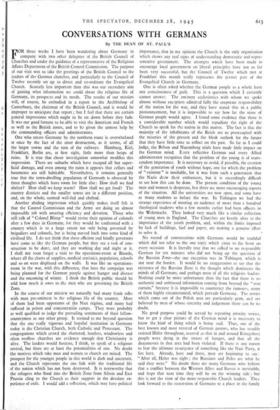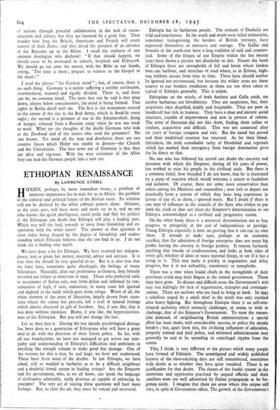CONVERSATIONS WITH GERMANS
By THE DEAN OF ST. PAUL'S
FOR three weeks I have been wandering about Germany in company with two other delegates of the British Council of Churches and under the guidance of a representative of the Religious
Affairs Department of the British Control Commission. The purpose of our visit was to take the greetings of the British Council to the leaders of the German churches, and particularly to the Council of Twelve recently set up to direct and co-ordinate the Evangelical Church. Scarcely less important than this was our secondary aim of gaining what information we could about the religious life of Germany, its prospects and its needs. The results of our mission will, of course, be embodied in a report to the Archbishop of Canterbury, the chairman of the British Council, and it would be improper to anticipate that report ; but I feel that there are certain general impressions which ought to be set down before they fade. It was our good fortune to be able to visit the American and French as well as the British zones, and to be given the utmost help by the commanding officers and administrators.
One who enters Germany by the northern route is overwhelmed at once by the fact of the utter destruction, as it seems, of all the larger towns and the ruin of the railways. Hamburg, Kiel, Frankfurt, Berlin are, at first sight, little more than heaps of ruins. It is true that closer investigation somewhat modifies this impression. There are suburbs which have escaped all but super- ficial damage, and even among the ruins it appears that cellars and basements are still habitable. Nevertheless, it remains generally true that the town-dwelling population of Germany is obsessed by three thoughts which leave room for little else: How shall we find shelter? How shall we keep warm? How shall we get food? The country districts and the smaller towns are in a different position, and, on the whole, seemed well-fed and clothed.
Another abiding impression which quickly makes itself felt is that the Control Commission and the Army are doing an almost impossible job with amazing efficiency and devotion. Those who still talk of " Colonel Blimp " would revise their opinion of colonels after a few days in Germany, for they would be confronted with a country which is to a large extent not only being governed by brigadiers and colonels, but is being nursed back into some kind of civilised life. I do not think that these efficient and kindly governors have come to like the German people, but they see a task of con- struction to be done, and they are working day and night at it. I shall not soon forget a visit to the operations-room at Biiorde, where all the charts of supplies, medical statistics, population, schools and so on were displayed on the walls. It was like an operations- room in the war, with this difference, that here the campaign was being planned for the German people against hunger and disease and the oncoming of winter. I think the British public should be told how much it owes to the men who are governing the British Zone.
In the course of our mission we naturally had many frank talks with men pre-eminent in the religious life of the country. Most of them had been opponents of the Nazi regime, and many had suffered in prison and concentration camps. They were probably as well qualified to judge the prevailing sentiments of their fellow- countrymen as any other group. It seemed to me beyond question that the one really vigorous and hopeful institution in Germany today is the Christian Church, both Catholic and Protestant. The congregations which crowd the shattered, heatless, windowless and often roofless churches are evidence enough that Christianity is alive. The leaders would hesitate, I think, to speak of a religious revival, but there are at least the potentialities of one. No doubt the motives which take men and women to church are mixed. The Prospect for the younger people in this world is dark and uncertain, and the Church represents the one link with the traditional life of the nation which has not been destroyed. It is noteworthy that the refugees who flood into the British Zone from Silesia and East Prussia cling to the Church as their support in the desolate ex- perience of exile. I would add a reflection, which may have political importance, that in my opinion the Church is the only organisation which shows any real signs of understanding democratic and .repre- sentative government. The attempts which have been made to encourage local government on liberal principles have not so far been very successful, but the Council of Twelve which met at Frankfurt this month really represents the greater part of the Evangelical Church in Germany.
One is often asked whether the German people as a whole have any consciousness of guilt. This is a question which I certainly
cannot answer. The eminent ecclesiastics with whom we spoke almost without exception admittv:1 fully the corporate responsibility of the nation for the war, and they have stated this in a public pronouncement, but it is impossible to say how far the mass of German people would agree. I found some evidence that there is a considerable number which would repudiate the right of the Church to speak for the nation in this matter. The fact is that the majority of the inhabitants of the Reich are so preoccupied with the miseries of the present and the bleak outlook for the future that they have little time to reflect on the past. So far as I could judge, the Belsen and Nuremberg trials have made little impact on the German mind. Every reflective German and every Allied administrator recognises that the problem of the young is of trans- cendent importance. It is necessary to avoid, if possible, the creation of the generation of youth without hope, one for which the problem of " existenz " is insoluble, for it was from such a generation that the Nazis drew their enthusiasts, but it is exceedingly difficult to see how this can be done. The present condition of the young men and women is desperate, but there are more encouraging aspects of the situation. All the universities are now open, and some have as many students as before the war. In Tilbingen we had the strange experience of meeting an audience of more than a hundred theological students who a few months earlier had been officers in the Wehrmacht. They looked very much like a similar collection of young men in England. The Churches are keenly alive to the importance of the youth problem, and, within the limits imposed by lack of buildings, fuel and paper, are making a genuine effort to solve it.
No record of conversations with Germans would be truthful which did not refer to the one topic which came to the front on every occasion It is literally true that we talked to no responsible German for ten minutes who did not bring up the question of the Russian Zone—the one exception was in Tubingen, which is not near the border. It would be no exaggeration to say that the existence of the Russian Zone is the thought which dominates the minds of all Germans, and perhaps most of all the religious leaders. Nothing could be more unfortunate than the fact that there is no authentic and unbiassed information coming from beyond the " iron curtain," because it is impossible to counteract the rumours, many of them highly circumstantial, which pervade Germany. The stories which come out of the Polish area are particularly grim, and are believed by men of whose sincerity and judgement there can be no doubt.
No good purpose could be served by repeating atrocity stories, but to get a clear picture of the German mind it is necessary to know the ,kind of thing which is being said. Thus, one of the best known and most revered of German pastors, who has steadily resisted Hitler throughout, assured as that in and around Konigsberg people were dying in the streets of hunger, and that all the deaconesses in that area had been violated. If there is any reason to fear the ultimate resurgence of something like the Nazi Party, it lies here. Already, here and there, men are beginning to say : " After all, Hitler was right ; the Russians and Poles are what he said they were." No doubt there are many Germans who believe
that a conflict between the Western Allies and Russia is inevitable, and hope that next time they will be on the winning side ; but
this is not the view of the more responsible Church leaders. They look forward to the restoration of Germany to a place in the family
cf. nations through peaceful collaboration in the task of recon- struction and culture, but they are haunted by a great fear. They wonder how long the British, Americans and French will retain control of their Zones, and they dread the prospect of an advance of the Russians up to the Rhine. I recall the outburst of one eminent theologian who declared : " If that should happen, we should cease to be interested in schools, hospitals and Hilfswerk. We should go out onto the streets, with the Bible in our hands, crying, ' The time is short ; prepare to witness to the Gospel to the death.'"
I used the phrase " the German mind " ; but, of course, there is no such thing. Germany is a nation suffering a terrible retribution, overwhelmed, stunned and rigidly divided. There is, and there can be, no common mind. The most that can be said is that deep down, almost below consciousness, the mind is being formed. Two sights in Berlin dwell with me. The first is the monument erected in the centre of the city to the Red Army, which is flood-lit every night ; the second is a prisoner of war in the Johannesshaft, dying of hunger, released from a Russian camp when he was too weak to work. What are the thoughts of the docile Germans who look at the Denkmal and of the sisters who tend the prisoners? No one knows. Yet amid all the ruin and desolation there are two creative forces which Hitler was unable to destroy—the Church and the Universities. The best news out of Germany is that they are alive and vigorous. With the wise assistance of the Allies they can lead the German people into a new era.































 Previous page
Previous page